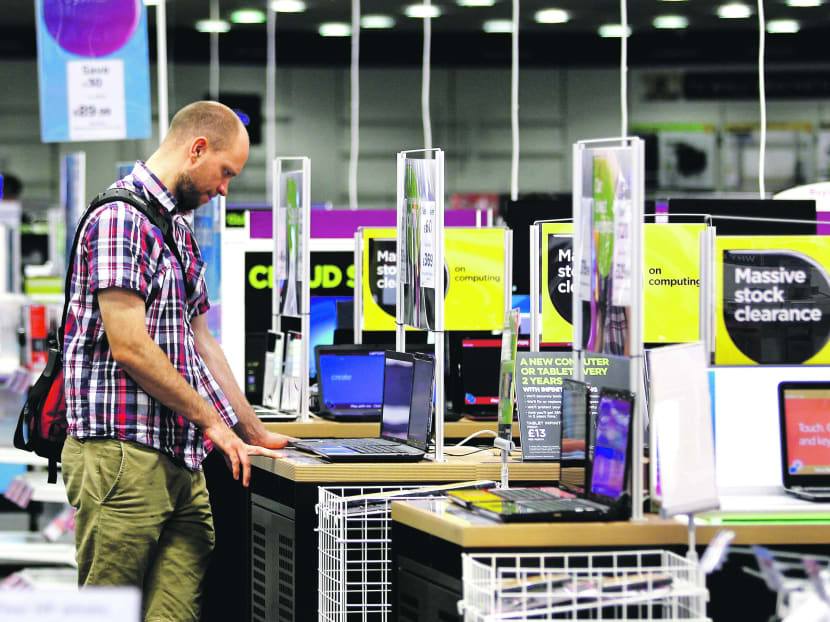‘PCs will not go away in the next five or 10 years’
SINGAPORE — Market researchers International Data Corporation (IDC) last week hammered another nail in the PC coffin. In its latest report, IDC said tablet sales will overtake PCs in the fourth quarter of the year ¬– credited to the Christmas push – but added that full year PC sales will still edge out those of the tablets for this year and next. This trend will change, however, by 2015 when tablets will outsell PCs, with the trend to stay permanent, said IDC.

PCs are no longer the choice for a consumer’s first computing device. Photo: Bloomberg
SINGAPORE — Market researchers International Data Corporation (IDC) last week hammered another nail in the PC coffin. In its latest report, IDC said tablet sales will overtake PCs in the fourth quarter of the year ¬– credited to the Christmas push – but added that full year PC sales will still edge out those of the tablets for this year and next. This trend will change, however, by 2015 when tablets will outsell PCs, with the trend to stay permanent, said IDC.
But Managing Director of Toshiba Singapore Wu Tengguo thinks the PC will not deviate from the role of a core computing device. Speaking with TODAY, Mr Wu said: “The PC will still be the centre of everything, be it for work or home use. Naturally, you will have many other devices to complement your core computing device, depending on your usage, lifestyle, work requirement, home, hobby. But as far as Toshiba is concerned, we don’t think that computing device will peter out.”
Even as the company pushes through with an e-learning app that resides on the cloud, it will not abandon their core business of making mobile PCs, said Mr Wu. “Toshiba has been in the PC business for the last 20 to 30 years. That will not change.”
People are not ready to give up their PCs yet. “There are certain things we can’t do without at this moment. One is the keyboard and the other is the screen. The keyboard has been in existence since the PC was invented and it is still here.
“Screens may get thinner and thinner but they will not disappear,” added Mr Wu.
Mr Wu attributes the success of the tablet to their extreme lightweight, instant-on and always-connected features but said they also have limitations. It cannot accommodate more powerful processors because then it will draw down on the battery. And, like it or not, there are a lot of applications today that still needs to run on Windows.
“At best, what the tablet has done now is replace some of those unique usage models for some PC users. Whenever I travel, I see people removing their laptops, tablets from their bags to run them through the scanners. Some have their smartphones with the big screens, but many will have PCs.
“It’s very hard to find someone who doesn’t need a PC or a laptop. I don’t think it is going away in the next five or 10 years,” Mr Wu shared.
ECOSYSTEM DISRUPTED
As a major manufacturer of electronic goods from laptops to desktop PCs, tablets to external harddrives, and even appliances such as refrigerators, Toshiba does not have too much to fret over.
“What is happening in the last couple of years is that everybody is shocked by the drastic change in lifestyle. Of course, the Internet plays a big role but the smartphones and tablets are the ones that change the way we use the interface, by using our hands to swipe and all that,” said Mr Wu. “All these created a change in the way we live today.
“But the reality, the real thing that changed the PC, is that the ecosystem has been disrupted. Many years ago, you only have a group of PC manufacturers co-existing well, and working closely with Intel and Microsoft. Intel focused on the processor while Microsoft provided the operating system (OS), and you have the manufacturers working around this ecosystem.
“But in the last few years, this ecosystem had been broken or affected with situations such as Intel mulling over building its own smartphone for internal use. So suddenly, they want to produce hardware. Then Microsoft launched their Surface tablet, and that trust between the OS guy and the PC manufacturer is shaken. In the past, we did not have to worry about Microsoft selling hardware so we worked closely with them.
“When we didn’t have to worry about Microsoft selling hardware, we worked closely with them but now they are making tablets so the PC manufacturer has also become shaken, and they are trying to find out how to protect their core business.”
MOBILE COMPUTING
However, Toshiba will not defer from their core business of making mobile PCs, said Mr Wu. “Toshiba has been in the PC business for the last 20 to 30 years. That will not change.”
Even as Toshiba explores an e-learning app, available through the cloud (“With cloud, you don’t have to worry about OS; it will be available on all platforms,” Mr Wu said), they will not abandon the PC just because there’s a new thing.
“We will still focus on our core business of mobile computing since launching the world’s first laptop in 1995. Moving forward, I don’t think we’ll change that. That’s in our DNA,” said Mr Wu.
“But what is going to happen is we’ll have to think of other issues because of this change. Beyond OS, with the ecosystem disrupted, what we’re thinking is how we can support all these different devices in the market.
“Toshiba’s strength is that we produce key component technology and we’re also the only one, I believe, that still fully develop our own BIOS (Basic Input/Output System, a set of instructions that a PC uses to successfully start up).
“With this skillset, Toshiba has a much better capability to control a device. With so many devices out there – including the many from Toshiba such as tablets that run on Windows and Android – we need to learn how to manage all these different platforms,” said Mr Wu.
GROWING MARKET SHARE TOGETHER
With lines blurring between the software and hardware guys, everybody has to learn how to co-exist competitively, said Mr Wu. “Microsoft has their OS, and we’re using it, but they also have the Surface tablet and that is fine. We will launch our own tablets so there is some competition but you have to co-exist together.
“Besides, Microsoft’s tablet will contain several components from Toshiba as we sell memories, harddrives, display technology. It’s a new type of ecosystem now.”
Also, one of Toshiba’s philosophies – the reason why it’s still a relatively strong player – is not to compete and take market share from other people. It is also about creating the market, explained Mr Wu.
If the tablet market grows because Microsoft introduced the Surface, and helped to increase the public’s awareness of the tablet device, then the market will grow and everybody benefits, explained Mr Wu. “To me, I don’t wish somebody to die. But how this can create bigger demand. A lot of people are worried about tablet growth but, to me, that’s good because once you start using it, you’ll want more and more. Eventually it will lead to a requirement to buy a PC. It may be a temporary thing that’s affecting the PC but eventually people will come back.”
THE IDEAL PC
People are not ready to give up the PC yet said Mr Wu. “There are certain things that I think we cannot do without at this moment, unless we’re robots. For one, the keyboard. It has been in existence since the day the computer started and it’s still here. The keyboard is one of the biggest constraints in a laptop design, no matter how big or small you go.
“The other thing is the screen. You need to look at the display so when it becomes too small, you will start having limitations. So unless someone comes up with an affordable, maybe 3D projection, you will still need the display. And that display will change the form of the PC. I think every other thing, CPU, memory, storage can change over time, except the keyboard and screen. It may get thinner and thinner but it won’t disappear.”
The tablet’s success is attributed to its extreme lightweight, instant on and always-connected features, said Mr Wu. “Its size and form is good enough for you to carry around conveniently, but that also means there are limitations. You cannot put more powerful processors in it because then you’ll draw down the battery. For a tablet, you want the battery to last for at least a whole day.
“Then there are the applications. Like it or not, today there are still a lot of applications that need to run on Windows. And I don’t think Microsoft will disappear overnight, they will continue to evolve. At best, what the tablet has done now is replace some of those unique usage models for some PC users.
“Whenever I travel, I see people removing their laptops, tablets from their bags to run them through the scanners. Some even have their smartphones with the big screens, but many will have PCs. It’s very hard to find someone who doesn’t need a PC or a laptop. I don’t think it is going away in the next five or 10 years.”







